|
|
|
Sort Order |
|
|
|
Items / Page
|
|
|
|
|
|
|
| Srl | Item |
| 1 |
ID:
151460
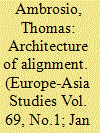

|
|
|
|
|
| Summary/Abstract |
The relative durability of the growing alignment between Russia and China is perhaps the central question regarding this relationship. This article examines the degree to which cooperation and policy coordination have become institutionalised between these two states through the creation of a complex and self-reinforcing network of bilateral and multilateral agreements. Grounded in the literature on treaty nestedness and utilising social network analysis, this article examines 154 bilateral Russia–China agreements and 54 agreements and declarations signed under the Shanghai Cooperation Organisation.
|
|
|
|
|
|
|
|
|
|
|
|
|
|
|
|
| 2 |
ID:
188302


|
|
|
|
|
| Summary/Abstract |
Following the 2014 Ukraine crisis, Belarus and Kazakhstan appear caught in an alliance security dilemma characterised by intra-alliance threat and entrapment, as both are potential targets of militarised hybrid warfare by their vastly more powerful ally, Russia. Despite having sought foreign policy flexibility between the two increasingly opposed geopolitical camps of the West and Russia, Minsk and Nur-Sultan appear drawn further towards Moscow. Utilising their pre- and post-2014 national security documents, reinforced by an examination of their rhetoric and policies, this essay demonstrates how both countries reassessed their security environment in the wake of the annexation of Crimea and the initial war in the Donbas region.
|
|
|
|
|
|
|
|
|
|
|
|
|
|
|
|
| 3 |
ID:
084441
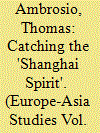

|
|
|
|
|
| Publication |
2008.
|
| Summary/Abstract |
This article examines how the Shanghai Cooperation Organization (SCO) seeks to undermine democratisation in Central Asia. Prior studies of the interplay between international organisations and democracy have tended to examine only one half of this relationship: whether, how, and under what circumstances do international organisations promote democracy? However, the opposite has been largely ignored: how do international organisations sustain autocracy? Authoritarian governments are increasingly adopting policies aimed at preserving their political power and the SCO represents an additional strategy in this regard: utilising multilateral cooperation to defend themselves against regional or global democratic trends. As such, the 'Shanghai Spirit' may be a sign of things to come as autocratic leaders become more bold in their rejection of democratic norms.
|
|
|
|
|
|
|
|
|
|
|
|
|
|
|
|
| 4 |
ID:
067264
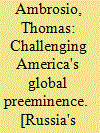

|
|
|
|
|
| Publication |
Hampshire, Ashgate, 2005.
|
| Description |
x, 196p.
|
| Standard Number |
0754642895
|
|
|
|
|
|
|
|
|
|
|
|
Copies: C:1/I:0,R:0,Q:0
Circulation
| Accession# | Call# | Current Location | Status | Policy | Location |
| 050524 | 327.47/AMB 050524 | Main | On Shelf | General | |
|
|
|
|
| 5 |
ID:
100198


|
|
|
|
|
| Publication |
2010.
|
| Summary/Abstract |
As the color revolutions have stalled and the challenge to democracy by authoritarianism has increased, it is essential to explore the potential of a new ``reverse wave'' which may create a greater balance between liberalism and autocracy. This article seeks to begin this process by outlining a framework of authoritarian diffusion. Two key diffusion dynamics are outlined: appropriateness, the impact of changes in the relative normative power of democracy/autocracy, and effectiveness, how the successes of authoritarian countries increase the chances that others will see them as role models. A number of contributing factors are also identified, which make these processes more or less likely. These include: geography, linkage, international organizations, great power prestige, and reference groups. If we are to understand the future strength of authoritarianism as a global or regional phenomenon, which affects, reinforces, and aggravates domestic conditions, then a new theoretical framework is necessary.
|
|
|
|
|
|
|
|
|
|
|
|
|
|
|
|
| 6 |
ID:
171822
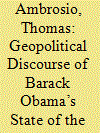

|
|
|
|
|
| Summary/Abstract |
President Barack Obama came to office with the expressed intention of breaking with the geopolitical orientation of his predecessor. Obama argued that George W. Bush overemphasized the Middle East at the expense of the Asia-Pacific region, the war in Afghanistan, rising non-Western states, and domestic affairs. To this end, Obama sought a strategic shift away from the Middle East and toward these other geographic areas. Obama also sought changes to policies which were closely associated with Bush’s focus on the Middle East: counterterrorism, democracy promotion, and foreign military interventions. This article evaluates whether this proposed reorientation away from the Middle East was reflected in Obama’s geopolitical discourse by examining his State of the Union addresses in comparison to those of his predecessor. It finds that these intended changes were largely evident in these speeches in that they exhibited a far greater geographic diversity than Bush’s, reflected adjustments to these policies, and paid substantially more attention to domestic affairs. However, this shift was limited by external events and the Middle East continued to command Obama’s primary focus. These findings reinforce the notion that while leaders seek to shape geopolitical understandings through their discourse, this discourse is in turn restricted by global realities.
|
|
|
|
|
|
|
|
|
|
|
|
|
|
|
|
| 7 |
ID:
072888
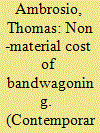

|
|
|
|
|
| Publication |
2006.
|
| Summary/Abstract |
The decision to balance against or bandwagon with the United States is heavily influenced by non-material values, especially the perceived status and prestige of the major powers. As a test case, this essay examines the nexus between the US, Russia, and Yugoslavia during the early 1990s. Russia's initial pro-Western foreign policy gave way to a new grand strategy emphasizing Russia's great power status and the independence of its foreign policy. Heavily influenced by non-material values, especially the perceived status and prestige of major powers, the Kremlin's initial, pro-Western foreign policy was deemed unacceptable by a broad spectrum of Russian foreign policy elites not primarily because of perceived threats to Russian security interests, but rather because its Western alignment was seen as incompatible with Russia's desired status as a great power. The emphasis on balancing against the United States continues to this day, corresponding to discontent with the unipolar international system. Why did Russian grand strategy change? What were the long-term effects for Russo-American relations? What, if anything, can the United States do to avoid future balancing behaviour in the other major powers?
|
|
|
|
|
|
|
|
|
|
|
|
|
|
|
|
| 8 |
ID:
189395
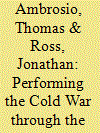

|
|
|
|
|
| Summary/Abstract |
Scholarly study of the popular geopolitics of boardgames has lagged behind that of other ludic artefacts, such as toys and videogames. This article examines the boardgame Twilight Struggle as a premiere example of a historically-structured boardgame (HSBG). HSBGs are distinct for their tight and intentional integration of narrative, gameplay, and in-game freedoms consistent with historical events, processes, and actors. Although not requiring players to follow a pre-set script, HSBGs are structured so that their available options, incentives, and victory conditions ensure that players act in a historically accurate manner. The effect is that players re-enact or perform a version of this history, even if they are unfamiliar with it. By focusing on what HSBGs make players do, rather than the representations embedded within them, this study contributes to our understanding of the performative agency of popular geopolitical objects.
|
|
|
|
|
|
|
|
|
|
|
|
|
|
|
|
| 9 |
ID:
144776
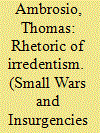

|
|
|
|
|
| Summary/Abstract |
Following the February 2014 fall of Viktor Yanukovych as president of Ukraine and the installation of a pro-Western government in Kiev, Russia initiated an irredentist intervention to annex the Crimean peninsula. Although much attention has focused on the use of military forces without country or unit insignia (the ‘little green men’ of irregular warfare), a crucial part of this operation involved a complex and multilayered perception management campaign to advance a self-interested narrative, which defined the contours of debate, justified their actions at home and abroad, and provided those actions with legal and normative legitimacy. This article examines the Kremlin’s rhetoric in three areas: Crimea’s secession from Ukraine was a legal act of self-determination; Russia possesses justifiable historical, cultural, and legal claims to Crimea; and, Western criticism of Russia’s actions are dishonest and a reflection of their anti-Russian, Cold War mentality.
|
|
|
|
|
|
|
|
|
|
|
|
|
|
|
|
| 10 |
ID:
152718
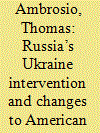

|
|
|
|
|
| Summary/Abstract |
The Russian Federation’s intervention in Ukraine in the spring of 2014 triggered a significant shift in the US government’s perception of that country. Before that event, statements by US officials depicted Russia as a non-threatening potential partner with compatible interests and common security concerns. After the Ukraine intervention, officials characterized Russia as a significant threat to the United States, its allies, and the European regional order. This article explains why the intervention precipitated such a profound change in American threat perceptions—that is, it links the action (Russia’s intervention in Ukraine) to the reaction (the US change in threat assessments). Through a detailed examination of executive branch testimony to the House and Senate Armed Services Committees from January 2008 to February 2016, this article demonstrates that Russia’s intervention in Ukraine was seen by the United States as an unacceptable breach of international law and norms, including the principles of state sovereignty, the sanctity of borders, and territorial integrity. From the American perspective, Russia’s violation of these fundamental rules necessitated a questioning of prevailing American assumptions about Russia. Furthermore, the potential for future aggression by Russia had to be taken seriously. It was this factor of Russia as a “rule breaker” that directly led the United States to reassess the threat posed to it by Russia, rather than alternative explanations such as the application of new Russian military tactics, an increase in Russian military capabilities, politics surrounding Russian national identity or system of government, or Ukraine’s geopolitical value to the United States.
|
|
|
|
|
|
|
|
|
|
|
|
|
|
|
|
| 11 |
ID:
070207
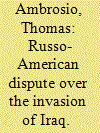

|
|
|
| 12 |
ID:
067642
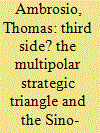

|
|
|
|
|
|
|
|